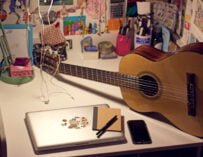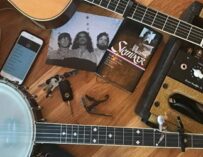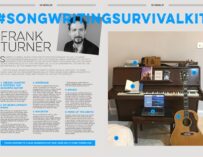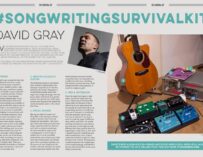
MiDi KwaKwa: “Sometimes, a whole song comes directly from a diary entry.” MiDi’s songwriting survival kit
Diary, guitar, mic, laptop – each shapes the German-Ghanaian singer and songwriter’s creative output: intuitive, reflective, analogue-rooted, and emotionally precise
MiDi KwaKwa is a German-Ghanaian singer, songwriter, and visual artist whose music weaves together neo soul, alternative R&B, and electronic textures. Her new EP Moonflower offers an intimate portrait of resilience, mental health, and feminine self-possession, shaped by personal experience and cultural heritage. Drawing inspiration from Lauryn Hill and Amel Larrieux, MiDi’s emotionally vivid songs like DiH and Desire, navigate heartbreak, longing, and desire with lyrical precision. Recognised as one of Red Bull Music’s 17 Best Newcomers in 2019 and winner of Best Performer at Berlin’s Curl Con, the EP is the latest step in her exciting artistic development. Enthralled by her empowering songwriting, we wanted to know all about the items she just can’t create without…
More Songwriting Survival Kits
1. DIARY
I always carry my diary with me to every session – it’s become a cherished ritual. Whether I’m at home in my own studio or working with a producer, the first thing I do is flip through its pages to see if any of my entries resonate with the sound I’m hearing. This meditative process helps set the tone for the session. Sometimes, a whole song comes directly from a diary entry – of course, refined to fit the mood of the instrumentals. That’s really how I started songwriting. Sometimes, it’s also just ideas, or random words or drawings. I also really love to draw the things I feel and turn them into songs.
2. GUITAR
I can’t start my songwriting without the sound of a guitar. It helps me find my voice and discover the right melody to complement my lyrics. I started playing guitar years ago, but sadly never really took it so seriously. I can play some chords and still remember how to play Killing Me Softly [by Fugees]. So, most of the time, I ask my producer to get his guitar and start with a melody.
3. SHURE MICROPHONE
My Shure microphone was my first “big” investment after a gig, and I travel with it everywhere. Once I’m inspired by my diary or have settled on a theme, I start humming a melody. If I like the melody, I try to add words – even though often it’s just vibes without structured language. Listening back and refining my ideas is when the real session begins as soon as I hold that microphone.

MiDi KwaKwa: “I can’t start my songwriting without the sound of a guitar.”
4. PHONE
Although I love writing lyrics the old-fashioned way with pen and paper, I always keep my phone on hand. I use a songwriting app that saves all my lyrics in the cloud, making it easy to revisit and recycle old ideas. The Notes app is especially helpful when collaborating with others, as we can add each other as collaborators and create lyrics together. I also rely on the voice memo feature – I can’t live without it, since it’s devastating to lose a great song idea because I didn’t record it. I currently have over 100 song ideas, melodies, and lyric concepts stored on my phone…and it’s just a couple of months old.
5. MACBOOK AIR
I always have my MacBook Air with me – I specifically chose it because it’s cute, lightweight, and fits into almost any bag. I use Logic Pro to record my vocals and to quickly capture ideas whenever inspiration strikes. These moments can come out of nowhere – sometimes I have a full song in my head and need to get it out immediately. So, I’ll do a little solo jam session and sing whatever comes to mind. The next day, I listen back. If it still feels good, I’ll sit down to rewrite and re-record it. If not, I leave it as it is. I don’t really use my MacBook for writing lyrics – I think I’ve done that once or twice. It’s more of a tool to help me find the words. Once I’ve recorded something, I grab my diary or phone to write down the exact lyrics.
At the end of the day, every artist is different – and that’s exactly what makes us unique. I’ve found a songwriting process that really works for me, and one thing I can definitely say is: it’s always good to go back to the basics – pen and paper. Electronic devices are great, but I’ve put too much trust in my phone or laptop before and ended up “losing” some really good songs. With my diaries (and I have quite a few), I can always go back. It’s amazing to look through old entries and see how much I’ve evolved in my writing – or what kinds of stories used to interest me a couple of years ago. It’s honestly really interesting, and most importantly, it feels safe, for me at least.


































Related Articles